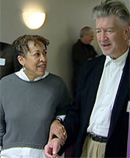|

Carmen N'Namdi speaks with David Lynch, founder of the David Lynch Foundation, which has provided grants to fund the teaching of the Transcendental Meditation programme to tens of thousands of students in countries throughout the world.
|
|
by Global Good News staff writer
26 March 2010
Carmen N'Namdi is Chief Education Officer of a Detroit middle school where more than 300 students and teachers practise the Transcendental Meditation Technique twice daily as part of the school's Wellness Program, one of the first programmes of its kind in the world.
Speaking at the press conference on Consciousness-Based Education held by the David Lynch Foundation in New York on 3 April 2009, Ms N'Namdi said that she has been practising Transcendental Meditation since 1973 and in deciding to add the technique to the school programme, she had considered a few points:
First was the difference between education as it used to be and education as it is now. Making this comparison, there were three things that came to mind, Ms N'Nmandi said: one is consistency.
'Yesterday, education was very consistent,' she said, 'even if it didn't make sense. You went to school with the same children that you lived in the neighbourhood with; and those were also the children you played with after school. There was a routine.'
Another was that you played after school and you had three recesses—morning, lunch, and afternoon. There was a lot of activity.
The third consideration was that there was a barrier between the adult world and the world of children. ‘There were certain things you just did not know about,’ Ms N’Namdi said. Television had three stations. There was not an opportunity for children to have a lot of input about what goes on in the world.
'Today, we don’t have that consistency,' Ms N'Namdi continued. 'People “shop” for schools. It doesn’t necessarily mean that you live in the same neighbourhood and play with the same children.
'We also don’t have time for a lot of physical activity, because we feel some kind of need to show academic outcomes and in showing all these academic outcomes, recess seems like a waste of time.'
So there is more rigour in the classroom, Ms N’Namdi said—‘though ironically that's when we need more recesses,’ she commented.
She also pointed out that living in a technological age there is so much more information coming in all the time. And through all the channels on television if something negative happens, ‘you watch that all day long—and so [does] the seven year old, and so [does] the five year old,' she said.
‘There's so much information coming in and yet the children really don’t have the maturity to digest all of this.’
As school leader, Ms N’Namdi took responsibility for the decision about how to help children navigate the 21st century. ‘What tools do they need to be able to address this new world because it isn’t going to change?’ Ms N’Namdi said.
So 13 years ago they implemented the Transcendental Meditation Technique in the school’s Wellness Curriculum. ‘We're a very health conscious school,’ Ms N’Namdi explained. ‘There is no red meat in our lunch programme; there's no caffeine; no teachers in the teachers' room with coffee. So we're a health conscious school.
‘We think it's so important that we set aside time each day, twice a day, to meditate. Our students go in during homeroom in the morning and again in the afternoon.’
Ms N’Namdi said that they have found that through Transcendental Meditation over the past 13 years, the children are more focused on their work; they're more patient with the learning experience; and they're more reflective about their behaviour.
‘We even have them say that they really appreciate just quiet time with themselves; and it's been noted a number of times that our children are extremely good in their interpersonal relationships—very supportive of each other.’
Ms N’Namdi added that this has become so important that Transcendental Meditation is also offered as a health benefit for the schools’ teachers.
She concluded her address to the press conference on Consciousness-Based Education by saying, ‘There's nothing more wonderful than to have teachers who don’t even work at the school anymore, or children who are now in high school, that call you and say “That was the greatest tool you could have ever given us.” ’
© Copyright 2010 Global Good News®
|


